On His Blindness, a Comparative Study of Borges and Milton (Multi-day Lesson)
Introduction
This lesson would fit will as a stand-alone, a unit on poetry or literary analysis, comparative analysis, or poetic form. The poems studied are sonnets, in similar style and structure.
The lesson looks at two poems written about blindness. The first was written by John Milton, an English poet from the 1600s. Milton was a politician and poet before going completely blind. Afterwards, he continued writing verse, but dictated it to a scribe (one of which was Andrew Marvel). His most well-known work, Paradise Lost, was written after he went blind and was consequently living in poverty.
Jorge Luis Borges (1899-1986), an Argentien poet, is the poet of the second poem. Borges went blind at the age of 55, but by this time was a well-established literary presence. Borges continued to write as well, and many critics point to his blindness as the cause of his explosive imagination. Borges famously said of his blindness, “When I think of what I've lost, I ask, 'Who know themselves better than the blind?”
More information about Milton can be found here, and Borges here.
Ages: 16+
Time: 2+ Lessons
Learning Objectives:
Analyze the different ways in which poets explore a similar theme.
Analyze the different ways the sonnet can be used to express a theme
Materials:
Steps:
Class #1: Milton
Activate (whole group):
Journal: How would you feel if tomorrow, you woke up and were not able to see?
Allow time to share in pairs or whole group.
Pass out Milton’s poem. Read three times:
First read: What doesn’t make sense? What words do you not know in this context? Clarify antiquated contractions, e’re /o’re
Second read: Highlight anything that catches your eye (word/phrase/question)
Third read: Same
Line-by-line: Read through each line, asking students to comment or question on what they noticed in the line. Aim for collective inquiry and steer away from “correctness.”
Questions to spark discussion if student contribution is thin:
What do you make of the line “light is spent?”
What might Milton mean by “that one Talent which is death to hide”? (Ask students if they have a talent that would be “death to hide” if one day it were to “lodge...useless” in them.) What does Milton use that Talent for?
What is he “fondly ask”ing?
Does God, in this poem, care about Talent? What matters to God in this poem?
5. In pairs: Decide on 1-2 sentences that summarize the poem, focusing on Milton’s attitude towards his blindness, which he terms “useless Talent.” Share out.
6. Discuss and take note:
What’s the tone in this poem (i.e., Milton’s attitude towards his subject)?
What imagery do you notice? (Emphasize the light and its various meanings.)
7. Closing questions:
The sonnet is traditionally used in love poetry. How might this affect your interpretation of this poem?
How does your journal exercise compare to Milton’s attitude towards his blindness? Would you react the same or differently?
Class 2: Comparing Borges with Milton
Learning Objectives:
Analyze the different ways in which poets explore a similar theme.
Analyze the different ways the sonnet can be used to express a theme
Steps:
Activate (whole group):
Journal: If you were not able to see tomorrow, describe what the experience would be like. What does not seeing “look” like? How would you describe it?
Allow time to share in pairs or whole group.
Pass out Borge’s poem. Read three times:
First read: What doesn’t make sense? What words do you not know in this context?
Second read: Highlight anything that catches your eye (word/phrase/question)
Third read: Same
Line-by-line: Read through each line, asking students to comment or question on what they noticed in the line. Aim for collective inquiry and steer away from “correctness.”
Questions to spark discussion if student contribution is thin:
How does Borge’s use of “light” differ from Milton’s? Why might this be?
The first half of the sonnet focuses on the experience of blindness: He refers to his blindness as: “a luminous mist” “a single thing, colorless, formless,” “a fog.” How does this compare to your description in your journal?
What kind of tone does he strike with this phrasing? How is it different from Milton’s?
In the second half, the poet mourns for what he has lost. What specifically does he miss? Is it what you would expect from someone losing sight? How is it different from what Milton misses? How would you feel different?
5. In pairs: Decide on 1-2 sentences that summarize the poem, focusing on Borge’s attitude towards his blindness. Share out.
6. Discuss and take note:
What’s the tone in this poem (i.e., Borge’s attitude towards his subject)?
What imagery do you notice? (Emphasize the light and its various meanings.)
7. Closing questions:
The sonnet is traditionally used in love poetry.
How might this affect your interpretation of this poem?
Why might Borge’s have chosen to emulate Milton’s poem?
